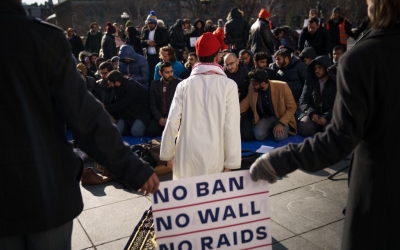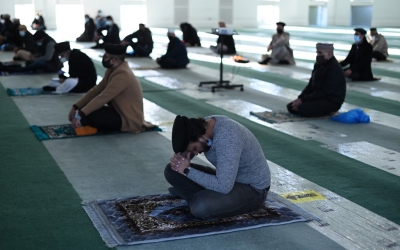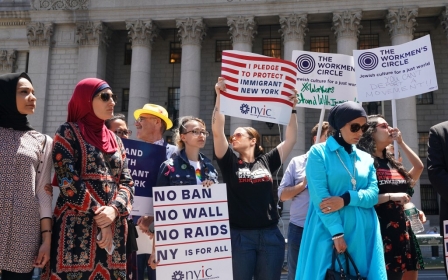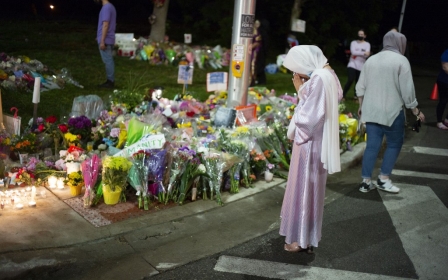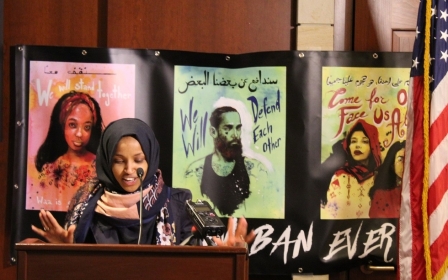Spirituality and mental health: American Muslims facing greater stigma than peers
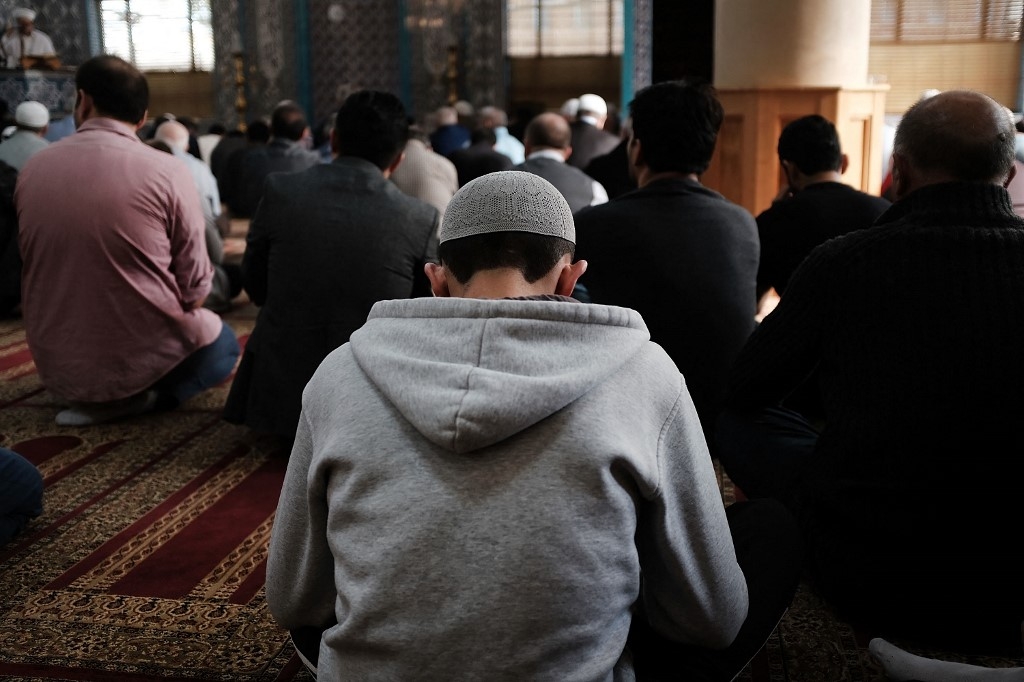
When Dina, now 22 years old, was in her senior year of high school in Baltimore, Maryland, she, like many teenagers, had a rough time with college applications.
Dina had studied a psychology course the previous year and realised that something wasn't right. During a bout of depression, she confided in her sister who advised her to seek help.
Over dinner one night, she plucked up the courage to tell her parents she wanted to see a therapist. Her parents, originally from Pakistan, were angered.
"I remember my mum telling me getting help was not something that the women in our family do," Dina told Middle East Eye.
"My mum said to me: 'Do you think I'm not depressed? Do you think your grandma is not depressed?'
New MEE newsletter: Jerusalem Dispatch
Sign up to get the latest insights and analysis on Israel-Palestine, alongside Turkey Unpacked and other MEE newsletters
"There was so much shame. There was this generational silencing of yourself and the people around you, and shaming them into not getting help for their mental illness."
When Dina began college and moved on to campus, she began seeing a therapist in secret and was able to get help - and continues to do so.
'Carrying the burden of trauma'
Mental health experts told MEE that while there's a stigma in seeking help among every community, it is particularly acute amongst Muslims, with mental health issues sometimes attributed to a lack of faith.
According to a study published in July by the Journal of the American Medical Association (Jama), nearly eight percent of Muslims reported a suicide attempt in their lifetime - compared with six percent of Catholics, five percent of Protestants and 3.6 percent of Jewish respondents.
Farha Abbasi, an assistant professor in the Department of Psychiatry at Michigan State University and the founding director of the annual Muslim Mental Health Conference, said older members of the Muslim community needed to accept mental health issues existed, to acknowledge suicide, and to seek help, as well as to encourage their children to do so.
'You did not deal with it and you passed it on to your children. And now they are carrying the burden of your trauma and their own struggles'
- Dr Farha Abbasi, Michigan State University
Abbasi told MEE that one of the more common questions young patients have is: "How do we communicate this to our parents?"
Parents, meanwhile, have framed the narrative around the younger generation being "lazy" in comparison with themselves. They tell her they were often working two jobs and surviving in a new culture in order to provide for their children: "We gave them everything," Abbasi says they tell her. "So why are they having issues?"
"I tell them this generation has seen three wars, has seen political chaos, economic meltdown, and while the rate of tuition has doubled, the job market has shrunk," said Abbasi. "When I came to the country, they said high school graduation was a big thing. In front of my eyes it became that a Bachelor's degree was important. Now we are telling this generation that until you become a professional, you have no future. It's a lot of pressure."
According to the National Institutes of Health, rates of depression and border personality disorder are higher in second-generation immigrants than their first-generation immigrant parents.
"And we underestimate these numbers. Why? It's because the first generation did not deal with their own trauma. They passed on their trauma," Abbasi said.
"When parents tell me 'But we were so strong'. I tell them 'No, you were not strong. You did not deal with it and you passed it on to your children. And now they are carrying the burden of your trauma and their own struggles'."
Mental health amid the pandemic
At the Khalil Center, a psychological and spiritual wellness center with offices across the US, the numbers of young people seeking help has risen dramatically in the past few years. In 2014, the Khalil Center held between 50 to 60 sessions a month. This year, numbers have hovered between 1,500 and 1,600 sessions a month.
Fahad Khan, a licensed clinical psychologist and the deputy director of the Khalil Center, said education was key; as was the location in which it was delivered, such as in local mosques and community centres.
Imams need to be trained in recognising symptoms and speaking about mental health issues, many studies show, otherwise, the conflation of mental illness with a lack of faith will continue, say experts.
"When someone says: 'You should pray more; it'll help you with depression.' That's not always true; in fact, in some cases it's not true at all. But what is true is that if someone does have a deeper connection with their religion, it serves as a protective barrier for severe mental health issues or suicide, and that's been shown through research," said Khan.
"We need to change the narrative. Instead of telling someone to pray more, tell them if they do pray more, if they have a meaningful relationship with their creator, it will serve as a protective barrier; it will create resilience for them to take on the challenges in this world."
Anisa Diab, a faith-based mental health counsellor in New York, told MEE that Muslim communities and mosques needed to work better with organisations on how to address suicide and mental illness.
"I always say prevention is the best intervention and unfortunately our communities get very reactionary when something like that happens and they want to do more post-intervention, and then they forget about it until another tragedy happens," Diab said.
"Most of the time suicide is preventable. Most of the time people will give some kind of warning sign or red flag that they’re considering suicide. And just like we learn CPR and how to do first aid, it's all of our responsibility to educate ourselves on mental health and help somebody who needs it."
Diab explained that hosting workshops in the community, schools, and mosques was helpful and made a difference. Even in her own private practice, the number of young Muslims who have been reaching out to get help with anxiety, depression, or panic attacks, had "skyrocketed", she said.
The support Muslims would normally find in their mosque and community was lessened with the pandemic, said Diab.
Waiting for the stigma to break
According to Shaykh Ibad Wali, the executive director and resident scholar at Hillside Islamic Center, mental illness in some cultures is often passed off as black magic or "possession" by a Jinn.
Wali said that dismissing it as such prevents young people from getting the help they need.
He added that, after telling one person their mental illness symptoms were not a result of a supernatural being, and pressing them to seek professional help, the person asked: "So do you have an amulet that I can wear to protect myself?"
Wali used an example from the Quran; in Surah Maryam, Maryam - known to Christians as Mary, the mother of Jesus - is, during her labour, saying "I wish I had died before this…"
"That is written in the Quran," he said. "That is Maryam; she's about to be the means of one of the greatest miracles in the history of humanity and she's in a situation where she's in extreme depression. One of the most pious women is about to bear one of the most pious men in human history and she is dealing with depression. It has nothing to do with 'Iman' [faith]."
For people such as Dina's parents, anything their local imam says is true. Dina remembered how there were several issues on which she was never able to get her parents to budge - but when they'd go to their mosque and their imam would talk about it, her parents would say: "You know, the imam is right."
Dina said she's waiting for the day the stigma no longer exists, her parents can accept that treatment for mental illness is available and her Muslim friends are freely able to seek help, instead of relying on what she calls "trickle-down therapy" - ie: if one of her friends is experiencing an anxiety attack, she'd pass down her knowledge from her own therapy as best as she can.
But until then, she will continue to meet secretly with her therapist.
"Mental illness is not shameful," she said. "That's something I really tried to ingrain into my little brother. In my head that's how you end this generational silence - one step at a time; you teach people there's nothing to be ashamed of."
Middle East Eye delivers independent and unrivalled coverage and analysis of the Middle East, North Africa and beyond. To learn more about republishing this content and the associated fees, please fill out this form. More about MEE can be found here.


